高中英语--ed和ing结尾的形容词练习
- 格式:pdf
- 大小:50.46 KB
- 文档页数:2
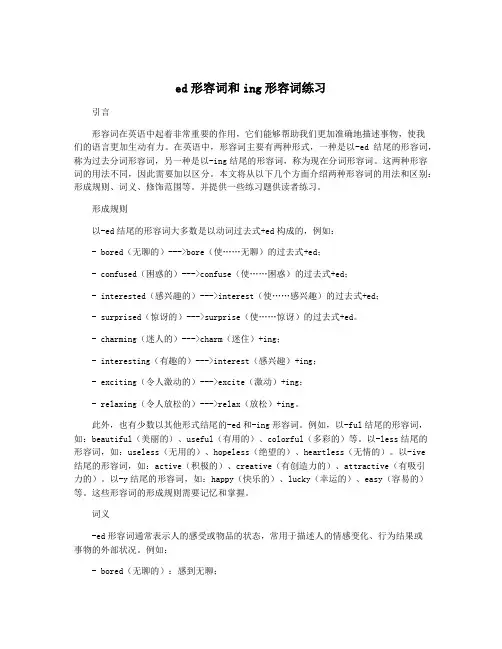
ed形容词和ing形容词练习引言形容词在英语中起着非常重要的作用,它们能够帮助我们更加准确地描述事物,使我们的语言更加生动有力。
在英语中,形容词主要有两种形式,一种是以-ed结尾的形容词,称为过去分词形容词,另一种是以-ing结尾的形容词,称为现在分词形容词。
这两种形容词的用法不同,因此需要加以区分。
本文将从以下几个方面介绍两种形容词的用法和区别:形成规则、词义、修饰范围等。
并提供一些练习题供读者练习。
形成规则以-ed结尾的形容词大多数是以动词过去式+ed构成的,例如:- bored(无聊的)--->bore(使……无聊)的过去式+ed;- confused(困惑的)--->confuse(使……困惑)的过去式+ed;- interested(感兴趣的)--->interest(使……感兴趣)的过去式+ed;- surprised(惊讶的)--->surprise(使……惊讶)的过去式+ed。
- charming(迷人的)--->charm(迷住)+ing;- interesting(有趣的)--->interest(感兴趣)+ing;- exciting(令人激动的)--->excite(激动)+ing;- relaxing(令人放松的)--->relax(放松)+ing。
此外,也有少数以其他形式结尾的-ed和-ing形容词。
例如,以-ful结尾的形容词,如:beautiful(美丽的)、useful(有用的)、colorful(多彩的)等。
以-less结尾的形容词,如:useless(无用的)、hopeless(绝望的)、heartless(无情的)。
以-ive结尾的形容词,如:active(积极的)、creative(有创造力的)、attractive(有吸引力的)。
以-y结尾的形容词,如:happy(快乐的)、lucky(幸运的)、easy(容易的)等。
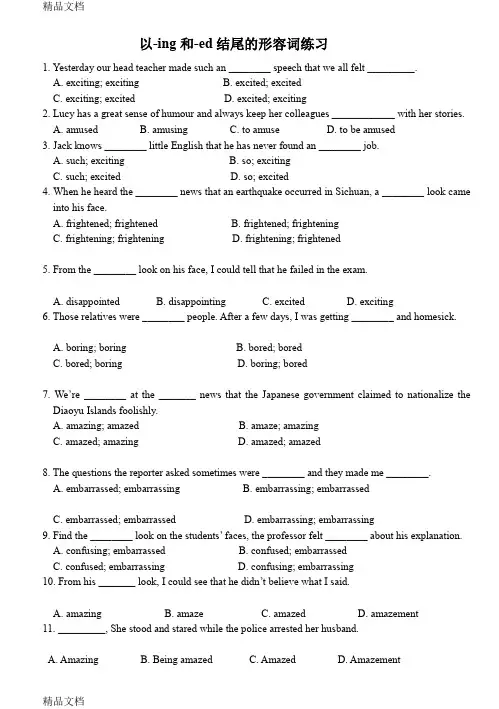
以-ing和-ed结尾的形容词练习1. Yesterday our head teacher made such an ________ speech that we all felt _________.A. exciting; excitingB. excited; excitedC. exciting; excitedD. excited; exciting2. Lucy has a great sense of humour and always keep her colleagues ____________ with her stories.A. amusedB. amusingC. to amuseD. to be amused3. Jack knows ________ little English that he has never found an ________ job.A. such; excitingB. so; excitingC. such; excitedD. so; excited4. When he heard the ________ news that an earthquake occurred in Sichuan, a ________ look came into his face.A. frightened; frightenedB. frightened; frighteningC. frightening; frighteningD. frightening; frightened5. From the ________ look on his face, I could tell that he failed in the exam.A. disappointedB. disappointingC. excitedD. exciting6. Those relatives were ________ people. After a few days, I was getting ________ and homesick.A. boring; boringB. bored; boredC. bored; boringD. boring; bored7. We’re ________ at the _______ news that the Japanese government claimed to nationalize the Diaoyu Islands foolishly.A. amazing; amazedB. amaze; amazingC. amazed; amazingD. amazed; amazed8. The questions the reporter asked sometimes were ________ and they made me ________.A. embarrassed; embarrassingB. embarrassing; embarrassedC. embarrassed; embarrassedD. embarrassing; embarrassing9. Find the ________ look on the students’ faces, the professor felt ________ about his explanation.A. confusing; embarrassedB. confused; embarrassedC. confused; embarrassingD. confusing; embarrassing10. From his _______ look, I could see that he didn’t believe what I said.A. amazingB. amazeC. amazedD. amazement11. _________, She stood and stared while the police arrested her husband.A. AmazingB. Being amazedC. AmazedD. Amazement12. From their ________ looks we can see that they were _________ by the question. (puzzle)13. It’s ___________ to do the difficult task. (embarrass)14. I am ___________ at the news. (amaze)15. Tom told us a lot of _____________ stories. (amaze)CABDA DCBBC C12puzzled; puzzled 13embarrassing 14 amazed 15 amazing。
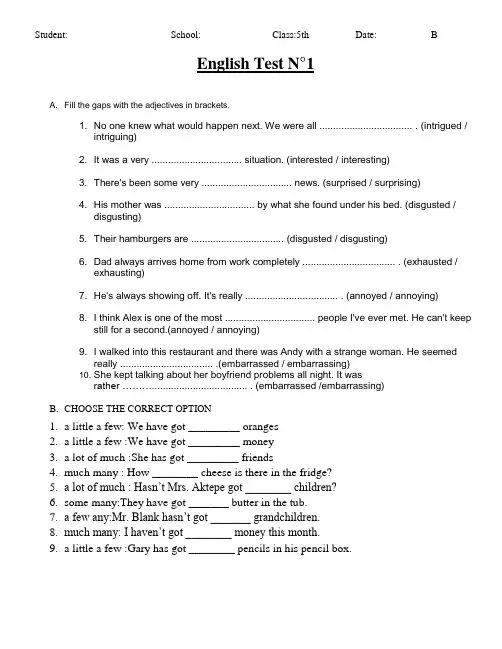
Student: ____________________ School:_____________ Class:5th_________ Date: _________ BEnglish Test N°1A. Fill the gaps with the adjectives in brackets.1. No one knew what would happen next. We were all .................................. . (intrigued /intriguing)2. It was a very ................................. situation. (interested / interesting)3. There's been some very ................................. news. (surprised / surprising)4. His mother was ................................. by what she found under his bed. (disgusted /disgusting)5. Their hamburgers are .................................. (disgusted / disgusting)6. Dad always arrives home from work completely .................................. . (exhausted /exhausting)7. He's always showing off. It's really .................................. . (annoyed / annoying)8. I think Alex is one of the most ................................. people I've ever met. He can't keepstill for a second.(annoyed / annoying)9. I walked into this restaurant and there was Andy with a strange woman. He seemedreally .................................. .(embarrassed / embarrassing)10. She kept talking about her boyfriend problems all night. It wasrather ………................................... . (embarrassed /embarrassing)B.CHOOSE THE CORRECT OPTION1.a little a few: We have got _________ oranges2.a little a few :We have got _________ money3.a lot of much :She has got _________ friends4.much many : How ________ cheese is there in the fridge?5.a lot of much : Hasn’t Mrs. Aktepe got ________ children?6.some many:They have got _______ butter in the tub.7.a few any:Mr. Blank hasn’t got _______ grandchildren.8.much many: I haven’t got ________ money this month.9.a little a few :Gary has got ________ pencils in his pencil box.。
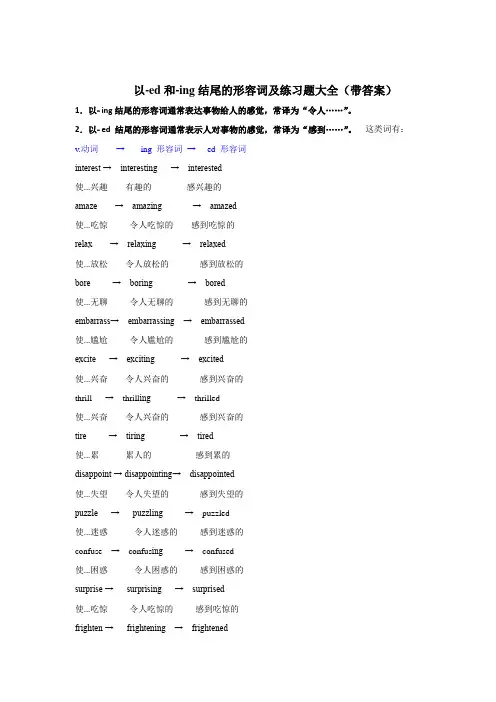
以-ed和-ing结尾的形容词及练习题大全(带答案)1.以ing结尾的形容词通常表达事物给人的感觉,常译为“令人……”。
2.以ed 结尾的形容词通常表示人对事物的感觉,常译为“感到……”。
这类词有:v.动词→ -ing 形容词→ -ed 形容词interest → interesting → interested使...兴趣有趣的感兴趣的amaze → amazing → amazed使...吃惊令人吃惊的感到吃惊的relax → relaxing → relaxed使...放松令人放松的感到放松的bore → boring → bored使...无聊令人无聊的感到无聊的embarrass→ embarrassing → embarrassed使...尴尬令人尴尬的感到尴尬的excite → exciting → excited使...兴奋令人兴奋的感到兴奋的thrill → thrill ing → thrilled使...兴奋令人兴奋的感到兴奋的tire → tiring → tired使...累累人的感到累的disappoint → disappointing→ disappointed使...失望令人失望的感到失望的puzzle → puzzling → puzzled使...迷惑令人迷惑的感到迷惑的confuse → confus ing → confused使...困惑令人困惑的感到困惑的surprise → surprising → surprised使...吃惊令人吃惊的感到吃惊的frighten → frightening → frightened使...害怕令人害怕的感到害怕的terrify → terrifying → terrified恐吓/吓唬令人恐惧的感到恐惧的satisfy → satisfying → satisfied使...满意令人满意的感到满意的please → pleas ing → pleased使...高兴令人愉快的感到高兴的/满意的amus e → am us ing → am used使...欢乐逗人笑的感到逗乐的astonish → astonishing → astonished使...惊讶令人惊讶的感到惊讶的shock→ shocking → shocked使...震惊令人震惊的感到震惊的annoy → annoying → annoyed使...烦恼令人烦的感到恼怒的move → moving → moved移动令人感动的感动的disappoint→ disappointing → disappointed使...失望令人失望的感到失望的threaten→ threatening → threatened恐吓/威胁胁迫的收到威胁的worry→worrying → worried使...担心令人担心的感到担心的练习题一,用所给词的适当形式填空1.This is an book, and I’m in it. (interest)2.Seeing the result, we are all .(disappoint).3.The (surprise) loo k on his face suggested that he hadn’t expected that.4.这匹受到惊吓的马开始跑起来。
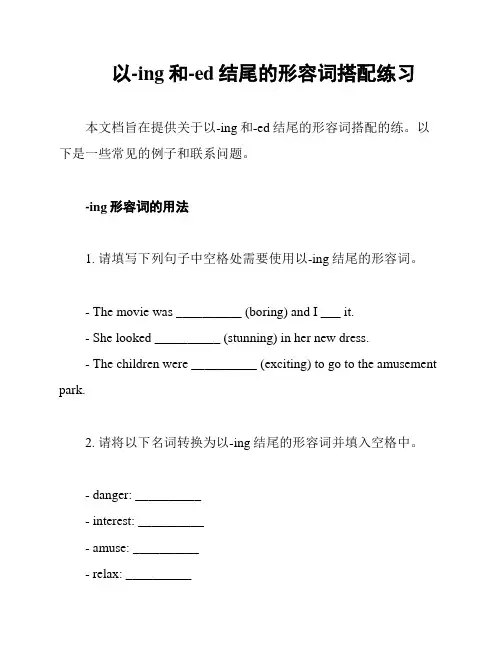
以-ing和-ed结尾的形容词搭配练习本文档旨在提供关于以-ing和-ed结尾的形容词搭配的练。
以下是一些常见的例子和联系问题。
-ing形容词的用法1. 请填写下列句子中空格处需要使用以-ing结尾的形容词。
- The movie was __________ (boring) and I ___ it.- She looked __________ (stunning) in her new dress.- The children were __________ (exciting) to go to the amusement park.2. 请将以下名词转换为以-ing结尾的形容词并填入空格中。
- danger: __________- interest: __________- amuse: __________- relax: __________-ed形容词的用法1. 请填写下列句子中空格处需要使用以-ed结尾的形容词。
- The news was __________ (unexpected) ___ surprise.- The meal was __________ (us) and I ___.- After the long hike, I felt __________ (exhausted) but satisfied.2. 请将以下名词转换为以-ed结尾的形容词并填入空格中。
- amaze: __________- inspire: __________- interest: __________- disappoint: __________总结本文档提供了以-ing和-ed结尾的形容词的练习。
通过填写空格,并结合相应的名词转换,您可以巩固对这些形容词的理解和正确用法。
希望这些练习对您的英语学习有所帮助!。
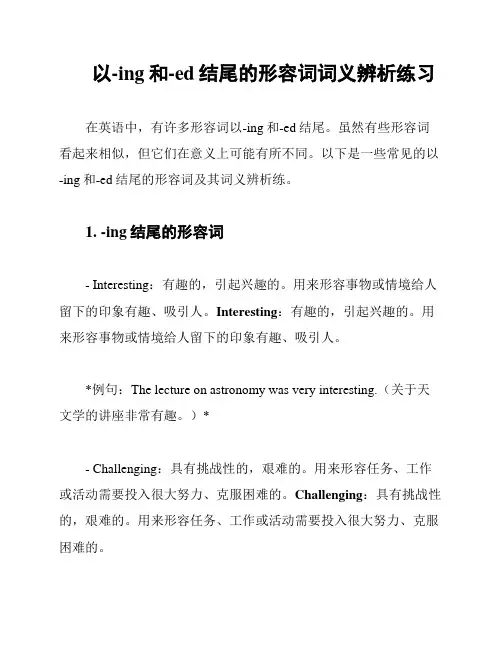
以-ing和-ed结尾的形容词词义辨析练习在英语中,有许多形容词以-ing和-ed结尾。
虽然有些形容词看起来相似,但它们在意义上可能有所不同。
以下是一些常见的以-ing和-ed结尾的形容词及其词义辨析练。
1. -ing结尾的形容词- Interesting:有趣的,引起兴趣的。
用来形容事物或情境给人留下的印象有趣、吸引人。
Interesting:有趣的,引起兴趣的。
用来形容事物或情境给人留下的印象有趣、吸引人。
*例句:The lecture on astronomy was very interesting.(关于天文学的讲座非常有趣。
)*- Challenging:具有挑战性的,艰难的。
用来形容任务、工作或活动需要投入很大努力、克服困难的。
Challenging:具有挑战性的,艰难的。
用来形容任务、工作或活动需要投入很大努力、克服困难的。
*例句:Running a marathon is a challenging experience.(参加马拉松是一次具有挑战性的经历。
)*- Exciting:令人兴奋的,激动人心的。
用来形容引起强烈兴奋、激动的事物或情景。
Exciting:令人兴奋的,激动人心的。
用来形容引起强烈兴奋、激动的事物或情景。
*例句:The roller coaster ride was very exciting.(坐过山车很令人兴奋。
)*2. -ed结尾的形容词- Bored:感到厌烦的,无聊的。
用来形容因缺乏刺激、无聊而感到厌烦的状态。
Bored:感到厌烦的,无聊的。
用来形容因缺乏刺激、无聊而感到厌烦的状态。
*例句:She felt bored during the long lecture.(她在长时间的讲座中感到很无聊。
)*- Pleased:感到高兴的,满意的。
用来形容因某种原因而感到高兴、满意的情绪。
Pleased:感到高兴的,满意的。
用来形容因某种原因而感到高兴、满意的情绪。
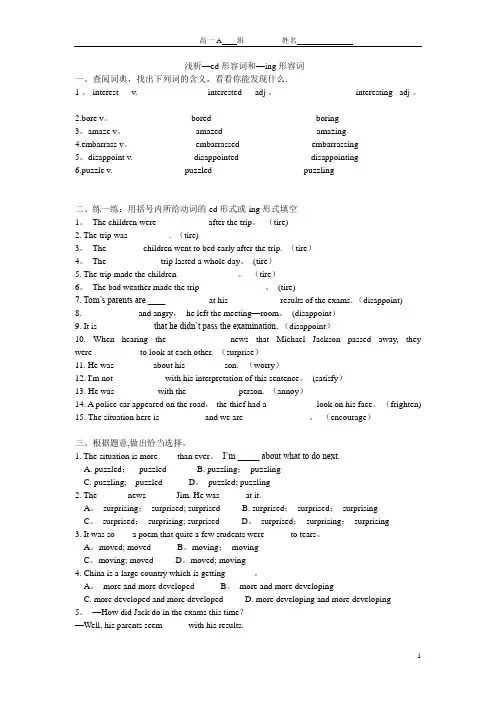
浅析—ed形容词和—ing形容词一、查阅词典,找出下列词的含义,看看你能发现什么.1。
interest v. _____________ interested adj。
_____________ interesting adj。
_____________2.bore v。
_____________ bored _____________ boring _____________ 3。
amaze v。
_____________ amazed _____________ amazing _____________ 4.embarrass v。
_____________ embarrassed _____________ embarrassing _____________ 5。
disappoint v. _____________ disappointed _____________ disappointing _____________ 6.puzzle v. _____________ puzzled _____________ puzzling _____________二、练一练:用括号内所给动词的-ed形式或-ing形式填空1。
The children were ___________ after the trip。
(tire)2. The trip was_________ . (tire)3。
The ________children went to bed early after the trip. (tire)4。
The __________ trip lasted a whole day。
(tire)5. The trip made the children_____________ 。
(tire)6。
The bad weather made the trip______________ 。
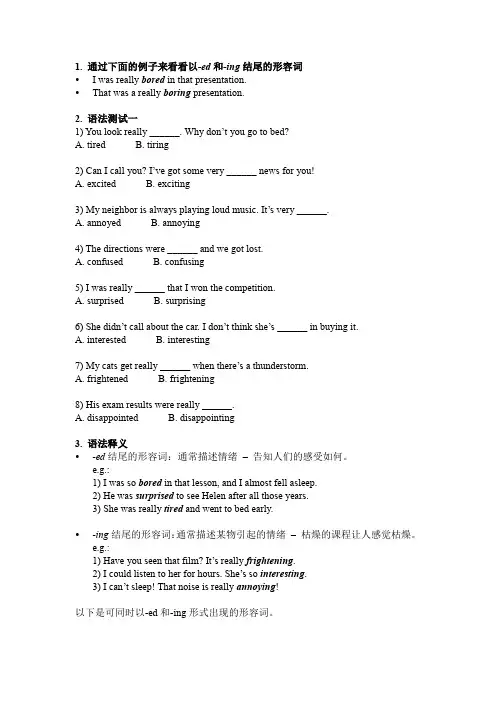
1. 通过下面的例子来看看以-ed和-ing结尾的形容词•I was really bored in that presentation.•That was a really boring presentation.2. 语法测试一1) You look really ______. Why don’t you go to bed?A. tiredB. tiring2) Can I call you? I’ve got some very ______ news for you!A. excitedB. exciting3) My neighbor is always playing loud music. It’s very ______.A. annoyedB. annoying4) The directions were ______ and we got lost.A. confusedB. confusing5) I was really ______ that I won the competition.A. surprisedB. surprising6) She didn’t call about the car. I don’t think she’s ______ in buying it.A. interestedB. interesting7) My cats get really ______ when there’s a thunderstorm.A. frightenedB. frightening8) His exam results were really ______.A. disappointedB. disappointing3. 语法释义•-ed结尾的形容词:通常描述情绪– 告知人们的感受如何。
e.g.:1) I was so bored in that lesson, and I almost fell asleep.2) He was surprised to see Helen after all those years.3) She was really tired and went to bed early.•-ing结尾的形容词:通常描述某物引起的情绪– 枯燥的课程让人感觉枯燥。

根据ing形容词和ed形容词经典练习根据-ing形容词和-ed形容词经典练1. 比较-ing形容词和-ed形容词的用法-ing形容词表示事物的性质或状态,通常用来描述人或物。
-ed形容词表示人或物的感受或状态,常常与人的情绪或感觉相关。
2. 形容-ing和-ed形容词的例子-ing形容词的例子:- 令人兴奋的:exciting- 令人困惑的:confusing- 令人感动的:moving- 令人着迷的:fascinating-ed形容词的例子:- 兴奋的:excited- 困惑的:confused- 感动的:moved- 着迷的:fascinated3. 区分-ing和-ed形容词的用法-ing形容词描述事物的性质或状态,而不是人或物的感受。
例如,“The movie was exciting.”(电影很刺激。
)表示电影本身很刺激,而不是人的感受。
-ed形容词描述人或物的感受或状态。
例如,“I was excited when I watched the movie.”(我看电影时感到兴奋。
)表示人对电影感到兴奋。
4. 练题请根据句子的语境选择合适的形容词,填入横线上:1. The book was __________.(interest/interested)2. I was __________ by the live concert.(amaze/amazed)3. The task seemed __________ at first.(confuse/confused)4. The movie was __________ and left me in tears.(move/moved)答案:1. interested2. amazed3. confusing4. moving总结:通过-ing形容词和-ed形容词的练习,我们可以更好地理解它们之间的区别和用法。
使用正确的形容词来描绘事物的性质和人的感受,能够让我们的语言更加准确生动。
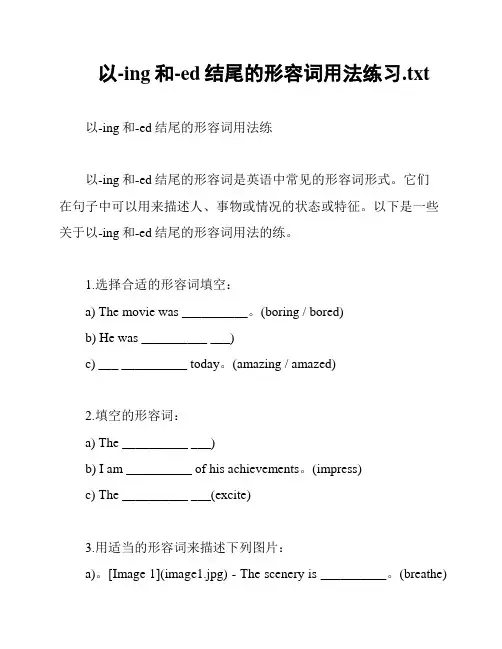
以-ing和-ed结尾的形容词用法练习.txt以-ing和-ed结尾的形容词用法练以-ing和-ed结尾的形容词是英语中常见的形容词形式。
它们在句子中可以用来描述人、事物或情况的状态或特征。
以下是一些关于以-ing和-ed结尾的形容词用法的练。
1.选择合适的形容词填空:a) The movie was __________。
(boring / bored)b) He was __________ ___)c) ___ __________ today。
(amazing / amazed)2.填空的形容词:a) The __________ ___)b) I am __________ of his achievements。
(impress)c) The __________ ___(excite)3.用适当的形容词来描述下列图片:a)。
[Image 1](image1.jpg) - The scenery is __________。
(breathe)b)。
[Image 2](image2.jpg) - The cake looks __________。
(us)c)。
[Image 3](image3.jpg) - The students are __________。
(bored)4.阅读以下句子,判断下列形容词是以-ing还是-ed结尾:a) She is a __________ singer。
(amazing)b) The book was __________。
(excite)c) They are __________ the new car。
(fascinate)答案:1.a) boring。
b) interested。
c) amazing2.a) exhausted。
b) impressed。
c) excited3.a) breathtaking。
b) us。
c) bored4.a) -ing。

以-ed和-ing结尾的形容词及练习题大全(带答案)1.以ing结尾的形容词通常表达事物给人的感觉,常译为“令人……”。
2.以ed 结尾的形容词通常表示人对事物的感觉,常译为“感到……”。
这类词有:v.动词→ -ing 形容词→ -ed 形容词interest → interesting → interested使...兴趣有趣的感兴趣的amaze → amazing → amazed使...吃惊令人吃惊的感到吃惊的relax → relaxing → relaxed使...放松令人放松的感到放松的bore → boring → bored使...无聊令人无聊的感到无聊的embarrass→ embarrassing → embarrassed使...尴尬令人尴尬的感到尴尬的excite → exciting → excited使...兴奋令人兴奋的感到兴奋的thrill → thrill ing → thrilled使...兴奋令人兴奋的感到兴奋的tire → tiring → tired使...累累人的感到累的disappoint → disappointing→ disappointed使...失望令人失望的感到失望的puzzle → puzzling → puzzled使...迷惑令人迷惑的感到迷惑的confuse → confus ing → confused使...困惑令人困惑的感到困惑的surprise → surprising → surprised使...吃惊令人吃惊的感到吃惊的frighten → frightening → frightened使...害怕令人害怕的感到害怕的terrify → terrifying → terrified恐吓/吓唬令人恐惧的感到恐惧的satisfy → satisfying → satisfied使...满意令人满意的感到满意的please → pleas ing → pleased使...高兴令人愉快的感到高兴的/满意的amus e → am us ing → am used使...欢乐逗人笑的感到逗乐的astonish → astonishing → astonished使...惊讶令人惊讶的感到惊讶的shock→ shocking → shocked使...震惊令人震惊的感到震惊的annoy → annoying → annoyed使...烦恼令人烦的感到恼怒的move → moving → moved移动令人感动的感动的disappoint→ disappointing → disappointed使...失望令人失望的感到失望的threaten→ threatening → threatened恐吓/威胁胁迫的收到威胁的worry→worrying → worried使...担心令人担心的感到担心的练习题一,用所给词的适当形式填空1.This is an book, and I’m in it. (interest)2.Seeing the result, we are all .(disappoint).3.The (surprise) loo k on his face suggested that he hadn’t expected that.4.这匹受到惊吓的马开始跑起来。
以-ing和-ed结尾的形容词语法规则练习当我们研究英语形容词时,经常会遇到以-ing和-ed结尾的形容词。
这种形容词通常用来描述人、事物或感受。
在研究和运用这些形容词时,我们需要了解它们的语法规则和用法。
本文将为您介绍以-ing和-ed结尾的形容词的语法规则,并提供一些练题供您巩固所学。
以-ing结尾的形容词以-ing结尾的形容词通常描述人或事物的特征、性质或状态。
它们可以用来表示一个正在进行的动作或现在的状态。
以下是一些常见的以-ing结尾的形容词:- 令人兴奋的(exciting)- 有趣的(interesting)- 令人惊讶的(surprising)- 令人愉快的(pleasing)- 令人困惑的(confusing)练题1:从下列选择中选出适当的以-ing结尾的形容词填空。
1. The movie was _________. I couldn't stop laughing.(funny / fun)2. He is a _________ person. He always has interesting stories to share.(bored / boring)3. The news was _________. It was unexpected.(surprised / surprising)以-ed结尾的形容词以-ed结尾的形容词通常用来描述人的感受或事物的特点。
它们可以表示过去或现在的状态,或者用来描述已经完成或已经发生的事情。
以下是一些常见的以-ed结尾的形容词:- 高兴的(happy)- 惊讶的(surprised)- 害怕的(scared)- 满意的(satisfied)- 受欢迎的(popular)练题2:从下列选择中选出适当的以-ed结尾的形容词填空。
1. She was _________ when she received the gift.(excited / exciting)2. The children were _________ by the magician's tricks.(amusing / amused)3. The food at the restaurant was _________. We enjoyed every bite.(delicious / delighting)通过这些练题,您可以巩固以-ing和-ed结尾的形容词的语法规则和用法。
ed ing 形容词练习题ed ing 形容词练习题在英语学习中,形容词是我们经常使用的一种词类。
它们可以用来描述人、事物的特征和状态。
其中,以-ed 和 -ing 结尾的形容词是我们常见的两种形容词形式。
接下来,我们将通过一些练习题来加深对这两种形容词的理解。
一、选择题1. The movie was _______. It made me feel sad.a) bored b) boring c) excited d) exciting2. She was _______ when she saw the beautiful sunset.a) amazed b) amazing c) interested d) interesting3. The book is _______. I couldn't put it down.a) bored b) boring c) excited d) exciting4. He is _______ about his upcoming trip to Europe.a) amazed b) amazing c) interested d) interesting5. The lecture was _______. I fell asleep halfway through.a) bored b) boring c) excited d) exciting二、填空题1. The _______ game kept the children entertained for hours.2. I'm _______ in learning about different cultures.3. The _______ movie made me cry.4. She was _______ by the beautiful scenery.5. The _______ book was hard to put down.三、改错题1. I am very exciting to go on vacation next week.2. The movie was very bored. I fell asleep halfway through.3. The book was so interested that I couldn't stop reading it.4. The roller coaster was amazing! I felt so scare.5. The documentary was boring, but the discussion afterwards was interested.四、解释题请用自己的话解释以下句子中-ed 和 -ing 形容词的区别。
ing和ed结尾的形容词题目
ing结尾的形容词:
encouraging 令人鼓舞的;
interesting 有趣的;
astonishing令人惊呆的;
surprising 令人惊奇的;
moving 令人感动的;
frightening令人害怕的;
terrifying 令人恐惧的;
puzzling 令人困惑不解的,等。
扩展资料
satisfying令人满意的;
tiring 令人厌倦的;
amazing令人惊讶的;
boring 令人讨厌的;;
exciting 令人兴奋的;
touching 触动人心的;
embarrassing令人尴尬的;
ed结尾的形容词:
encouraged 受到鼓舞的;
interested 感兴趣的;
astonished 惊呆的;
surprised 感到好奇的;
moved 感动的;
frightened 害怕的;
terrified 感到恐惧的;
puzzled 感到困惑的;
satisfied 感到满意的`;
tired感到厌烦的;
amazed 感到惊讶的;bored 感到厌烦的;excited 感到激动的;
touched 感动的;
embarrassed 尴尬的。
Use the '-ing' adjectives below to complete the sentences.
ageing rising existing increasing
1. The main problem is ____________ prices.
2. Factories in Japan are becoming even more automated,
making ________________ use of robots.
3. The young folk have all gone. There is no one left in the
village apart from a few _________ people.
4. Things have to change. The ____________ system simply
does not work.
Use the '-ed' adjectives below to complete the definitions.
alarmed bored satisfied depressed
If something makes you sad and unhappy, you feel
_____________.
If something makes you very worried, you are ____________.
If you are reasonably content with something, you feel
______________.
When you are ____________ you feel tired and impatient
because you have nothing to do.
adjectives ending in –ed / -ing
He and I were _________ . ( bored / boring ).
My aunt is a very __________ person. ( amused / amusing ).
I heard the joke before and I was not __________ . ( amused / amusing ). That is an ____________ book. ( interested / interesting ).
His grandfather is an ______________ person. ( interested / interesting ). The film was _____________ in the extreme. ( disgusted / disgusting ).
She was ____________ by the film last night . ( disgusted / disgusting ).
The traffic jam was very ____________ indeed. ( irritated / irritating ).
He was very ____________ by the traffic jam. ( irritated / irritating ).
The situation was very _____________ . ( frightened / frightening ).
I was very _____________ by the strange knock on the door. ( frightened / frightening ).
She was very ___________ because of the delay. ( annoyed / annoying ). It is very _____________ when you have to wait so long. ( annoyed / annoying ).
Complete the sentences with one of the words in the box. Careful! They are not all used.
Surprised interesting interested surprising annoyed bored boring frightened annoying exciting frightening
excited tiring worried tired worrying
a. The TV programme was _________________ so I turned it off.
b. Children can’t get to sleep on Christmas Eve. They’re too _______________.
c. “Hi, Mum!”.
“Carol! Thank goodness you rang! Where have you been? We’ve been so ___________________ about you!”.
d. “Hello, darling. I’ve got a present for you”.
“For me?”
“Don’t look so __________________. I often buy you presents”
“But it isn’t my birthday!”
e. The art exhibition was very __________________. I loved it, but I had to leave after three hours. My feet were killing me! I find going around art galleries and museums very _________________.
f. Some people don’t go out at night because they’re __________________ that someone will rob them.
g. Our financial situation is very __________________. We spend more and more, but we’re earning less and less.
h. “You’re yawning. Are you listening to what I’m saying?”
“I am! I’m really _______________. I want to know what happened. It’s just that I feel very ______________. I went to bed very late last night”.
i. “I’m going to a three-month holiday to the Far East”.
“ How ________________. Lucky you!”.
j. “Was your father __________________when you told him your exam results?”
“He was furious”.。